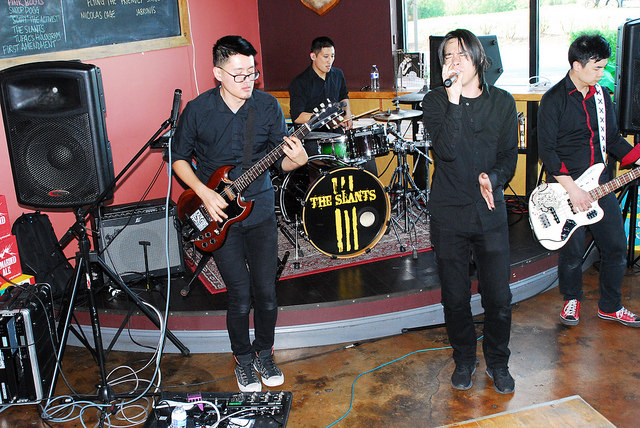In Matal v. Tam, 582 U.S. __ (2017), the U.S. Supreme Court unanimously ruled 8-0 that a federal law prohibiting trademark names that disparage others was unconstitutional because “speech may not be banned on the grounds that it expresses ideas that offend.”
Tam was refused trademark for disparaging band name
Simon Tam, the leader singer of the music band The Slants, sought to trademark the group’s name. While the term is derogatory to many, Tam believed that by taking the slur as the name of their band they could defuse the harmful power of the word. However, the Patent and Trademark Office denied the application, finding that the term was too offensive and disparaging.
Tam appealed to the U.S. Court of Appeals for the D.C. Circuit, which reversed on First Amendment grounds. The government then sought review by the U.S. Supreme Court.
Court ruled government cannot ban expression merely because it is offensive
In an opinion for the Court, Justice Samuel A. Alito, Jr. reasoned that the part of the trademark law that banned disparaging terms violated a “bedrock principle” of First Amendment law – that the government may not prohibit expression merely because it is offensive. He quoted Justice William Brennan’s famous passage from the flag-burning decision Texas v. Johnson (1989): “If there is a bedrock principle underlying the First Amendment, it is that the government may not prohibit the expression of an idea simply because society finds the idea itself offensive or disagreeable.”
Court rejected that trademarks were government speech
The government had argued that federal trademarks were a form of government speech and, thus, immune from First Amendment review. Alito rejected that argument, reasoning that trademarks are private speech, not government speech. “Holding that the registration of a trademark converts the mark into government speech would constitute a huge and dangerous extension of the government-speech doctrine,” Alito wrote. “For if the registration of trademarks constituted government speech, other systems of government registration could easily be characterized in the same way.”
Court said law was viewpoint discriminatory
Alito reasoned that the law was viewpoint discriminatory even though it applied to all groups, because “[g]iving offense is a viewpoint.” Because the law discriminated on the basis of content and viewpoint, Alito then addressed whether the Court should apply strict scrutiny or whether the law should be evaluated under intermediate scrutiny as a regulation of commercial speech under Central Hudson Gas & Elec. Corp. v. Public Serv. Comm. of N.Y. (1980).
Alito reasoned that the Court need not resolve whether the speech involved only commercial speech or also political speech, because the federal law at issue could not pass even the Central Hudson test. Under this test, the government must show that it has a substantial interest, that its regulation directly and materially advances the interest, and that the regulation is narrowly tailored. Alito reasoned that the federal law fails this test. He wrote that the clause was “far too broad” to be considered narrowly drawn.
Justice Anthony Kennedy wrote a concurring opinion to explain “in greater detail why the First Amendment’s protections against viewpoint discrimination apply to the trademark here.” Kennedy explained that “by mandating positivity, the law here might silence dissent and distort the marketplace of ideas.”
Justice Clarence Thomas also wrote a concurring opinion in which he continued to advocate the view that restrictions on truthful commercial speech should be evaluated under strict scrutiny, rather than under the Central Hudson test.
David L. Hudson, Jr. is a law professor at Belmont who publishes widely on First Amendment topics. He is the author of a 12-lecture audio course on the First Amendment entitled Freedom of Speech: Understanding the First Amendment (Now You Know Media, 2018). He also is the author of many First Amendment books, including The First Amendment: Freedom of Speech (Thomson Reuters, 2012) and Freedom of Speech: Documents Decoded (ABC-CLIO, 2017). This article was originally published in 2017.

